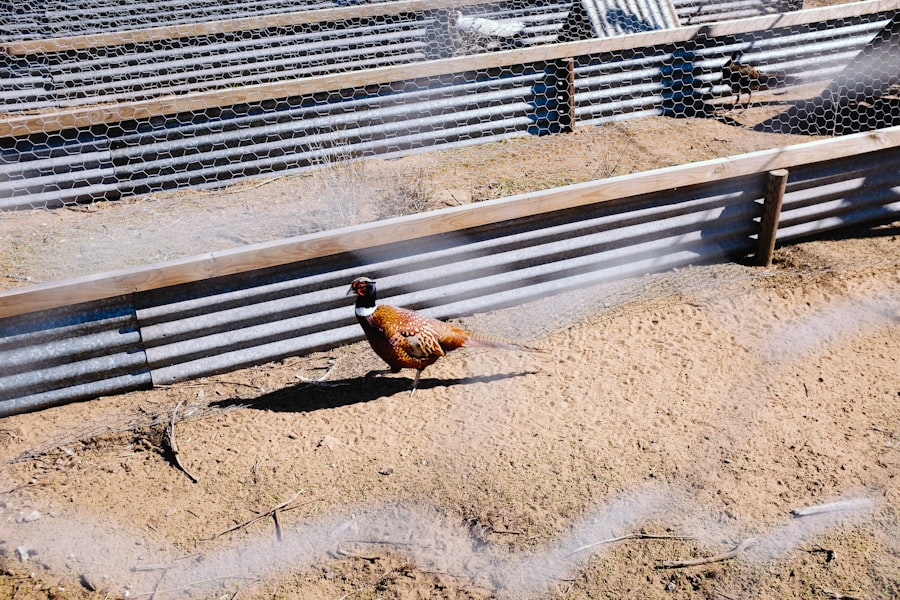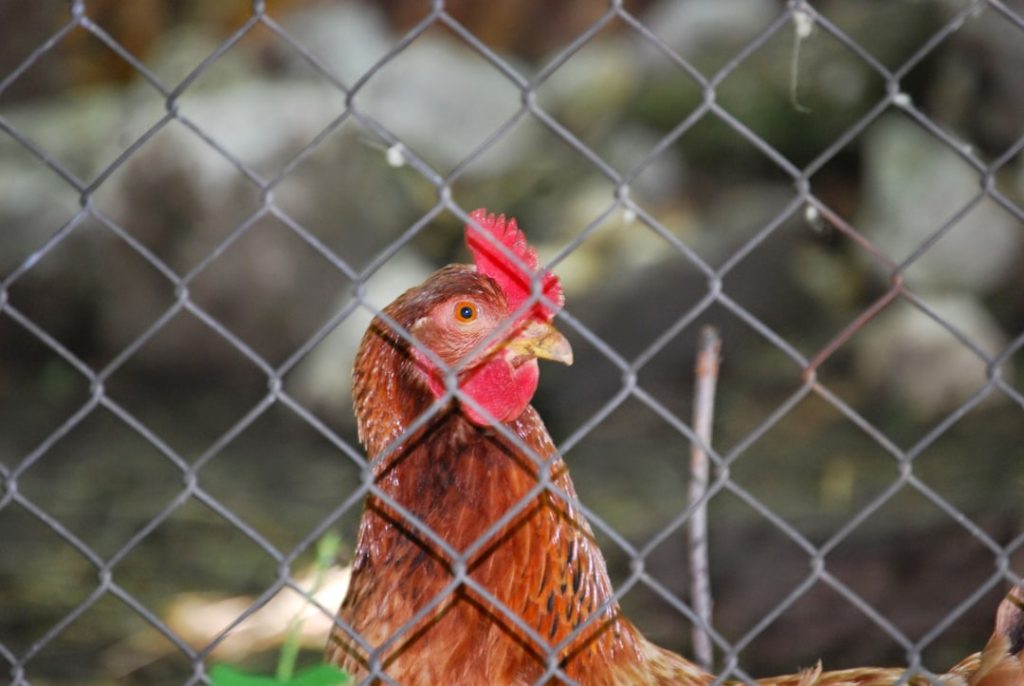Chickens exhibit natural behaviors that are important to consider when developing strategies to manage their presence in specific areas. These birds are inherently inquisitive and opportunistic, constantly exploring their environment in search of food and shelter. They are easily frightened and will quickly retreat from perceived dangers.
Understanding these characteristics is essential for implementing effective deterrent methods. The social nature of chickens plays a significant role in their behavior. They tend to follow the actions of dominant flock members, meaning that if one chicken discovers a food source or sheltered area, others are likely to follow suit.
Chickens also demonstrate a strong adherence to routine, often returning to the same locations repeatedly. These behavioral traits highlight the importance of creating physical barriers and utilizing natural deterrents to effectively keep chickens away from undesired areas. By recognizing and addressing these innate tendencies, it becomes possible to anticipate chicken movements and implement appropriate preventive measures.
Table of Contents
- 1 Creating Physical Barriers
- 2 Using Natural Deterrents
- 3 Implementing Scare Tactics
- 4 Providing Alternative Food Sources
- 5 Consistent Maintenance and Cleanup
- 6 Seeking Professional Help
- 7 FAQs
- 7.1 What are some natural ways to keep chickens away from the patio?
- 7.2 Are there any commercial products available to keep chickens away from the patio?
- 7.3 How can fencing be used to keep chickens away from the patio?
- 7.4 What are some other methods to keep chickens away from the patio?
- 7.5 Are there any legal restrictions on keeping chickens away from the patio?
Key Takeaways
- Chickens are naturally curious and will explore their surroundings, so understanding their behavior is crucial in deterring them from unwanted areas.
- Physical barriers such as fences and netting can effectively keep chickens out of specific areas and protect gardens or crops.
- Natural deterrents like predator urine or strong-smelling plants can help keep chickens away from certain areas without causing harm to the birds.
- Scare tactics such as motion-activated devices or noise makers can startle chickens and discourage them from entering restricted areas.
- Providing alternative food sources away from the protected areas can help redirect the chickens’ attention and reduce their interest in unwanted spaces.
- Consistent maintenance and cleanup of the area can help remove any potential attractions for chickens, such as spilled food or nesting materials.
- Seeking professional help from animal control or poultry experts may be necessary for persistent chicken-related issues that cannot be resolved with DIY methods.
Creating Physical Barriers
Fencing and Structural Barriers
One of the most effective ways to keep chickens out of unwanted areas is by creating physical barriers. This can be achieved through the use of fencing, netting, or other structures that prevent chickens from accessing specific locations. For example, installing a sturdy fence around a garden or crop field can effectively keep chickens from foraging and causing damage to plants.
Netting and Wire Mesh Barriers
Another option is to use netting or wire mesh to cover vulnerable areas such as fruit trees or outdoor furniture. This prevents chickens from roosting or nesting in these areas, ultimately discouraging them from returning.
Landscape Modification
Creating physical barriers can also include modifying the landscape to make it less appealing to chickens. For example, using rocks or gravel in areas where chickens tend to congregate can make it uncomfortable for them to walk or peck, ultimately deterring them from returning.
Using Natural Deterrents

In addition to physical barriers, natural deterrents can also be effective in keeping chickens away from unwanted areas. Chickens have a strong sense of smell and are sensitive to certain odors, making them less likely to frequent areas with strong scents they find unpleasant. For example, using natural repellents such as citrus peels, garlic, or vinegar can help deter chickens from specific locations.
Another natural deterrent is the use of predator decoys or sound devices that mimic the calls of predatory birds or animals. This can create a sense of danger for chickens, causing them to avoid the area altogether. Additionally, planting certain types of vegetation that chickens find unappealing can also help keep them away.
For example, planting prickly bushes or thorny plants around vulnerable areas can make it uncomfortable for chickens to access, ultimately discouraging them from returning.
Implementing Scare Tactics
Scare tactics can be an effective short-term solution for keeping chickens away from specific areas. This can include using visual deterrents such as reflective surfaces or shiny objects that create a sense of unease for chickens. For example, hanging CDs or aluminum foil strips in areas where chickens tend to congregate can create a visual disturbance that deters them from returning.
Another scare tactic is the use of motion-activated devices that emit sudden sounds or bursts of water when triggered by movement. This can startle chickens and create a sense of danger, ultimately causing them to avoid the area altogether. Additionally, using scarecrows or other lifelike figures can also be effective in deterring chickens from specific locations.
Providing Alternative Food Sources
One way to keep chickens away from unwanted areas is by providing alternative food sources in more suitable locations. By offering a designated feeding area with ample food and water, chickens are less likely to forage in areas where they are not wanted. This can be achieved by setting up feeding stations in areas away from vulnerable locations, ultimately redirecting their attention and reducing the likelihood of damage.
Additionally, planting cover crops or creating designated foraging areas can also help provide alternative food sources for chickens. By strategically placing these areas in more suitable locations, chickens are less likely to seek out food in unwanted areas. Providing alternative food sources not only helps keep chickens away from specific locations but also ensures that they have access to the nutrition they need.
Consistent Maintenance and Cleanup

Remove Attractants and Keep Outdoor Spaces Clean
Consistent maintenance and cleanup are essential in keeping chickens away from unwanted areas. By regularly removing food scraps, fallen fruit, or other attractants, it becomes less appealing for chickens to frequent these locations. Additionally, keeping outdoor spaces clean and free of debris reduces potential hiding spots and nesting areas for chickens.
Inspect and Repair Physical Barriers and Natural Deterrents
Regularly inspecting and repairing physical barriers and natural deterrents is also crucial in maintaining their effectiveness. Over time, these measures may become less effective due to wear and tear or exposure to the elements.
Ensure Long-Term Effectiveness
By consistently maintaining and repairing these deterrents, it ensures that they remain effective in keeping chickens away from unwanted areas.
Seeking Professional Help
In some cases, dealing with unwanted chicken behavior may require seeking professional help. This can include consulting with a poultry expert or animal behaviorist who can provide guidance on effective deterrent strategies. Additionally, professional pest control services may offer specialized solutions for keeping chickens away from specific areas.
Furthermore, local agricultural extension offices or poultry associations may offer resources and support for managing unwanted chicken behavior. By seeking professional help, it ensures that the most effective and humane strategies are implemented to address the issue at hand. In conclusion, understanding the behavior of chickens is crucial in developing effective strategies to keep them away from unwanted areas.
By creating physical barriers, using natural deterrents, implementing scare tactics, providing alternative food sources, and consistently maintaining and cleaning up outdoor spaces, it becomes possible to effectively manage unwanted chicken behavior. In cases where professional help is needed, consulting with experts in poultry management and pest control can provide valuable guidance and support in addressing the issue at hand.
If you’re looking for more tips on keeping chickens away from your patio, check out this article on chicken coop nest box ideas. Creating a comfortable and inviting space for your chickens to lay their eggs can help keep them from wandering onto your patio.
FAQs
What are some natural ways to keep chickens away from the patio?
Some natural ways to keep chickens away from the patio include using citrus peels, coffee grounds, or vinegar as a deterrent. Additionally, planting certain herbs such as lavender, mint, or rosemary can help repel chickens.
Are there any commercial products available to keep chickens away from the patio?
Yes, there are commercial products such as chicken repellent sprays or granules that can be used to keep chickens away from the patio. These products are typically safe for use around pets and children.
How can fencing be used to keep chickens away from the patio?
Installing a fence around the patio area can help keep chickens away. Make sure the fence is tall enough and has a secure bottom to prevent chickens from getting through or under it.
What are some other methods to keep chickens away from the patio?
Other methods to keep chickens away from the patio include using motion-activated sprinklers, setting up decoy predators, or using noise deterrents such as wind chimes or ultrasonic devices.
Are there any legal restrictions on keeping chickens away from the patio?
It’s important to check local ordinances and regulations regarding the keeping of chickens and the use of deterrents. Some areas may have specific rules about how chickens can be kept or deterred from certain areas.
Meet Walter, the feathered-friend fanatic of Florida! Nestled in the sunshine state, Walter struts through life with his feathered companions, clucking his way to happiness. With a coop that’s fancier than a five-star hotel, he’s the Don Juan of the chicken world. When he’s not teaching his hens to do the cha-cha, you’ll find him in a heated debate with his prized rooster, Sir Clucks-a-Lot. Walter’s poultry passion is no yolk; he’s the sunny-side-up guy you never knew you needed in your flock of friends!







